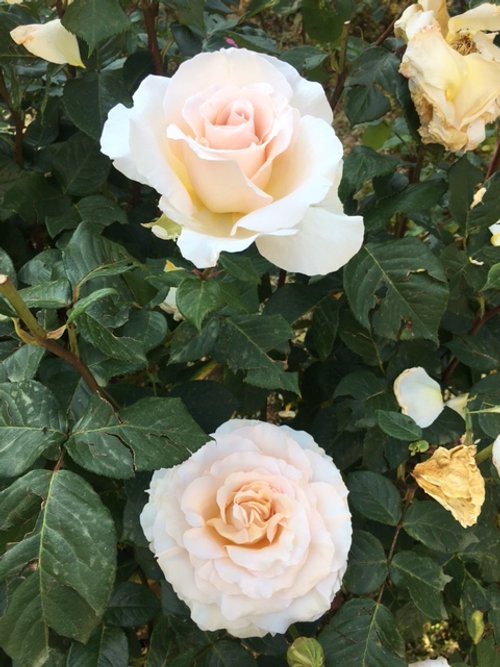July 2023
What else does it make sense to write about in the month of June, when I have something like 40 roses in full bloom? Each has its own particular beauty, whether of form, colour or scent – while some ‘have it all’, and leave the viewer – usually me, but sometimes friends as well – temporarily speechless.
They’re a fleeting joy, though. This spring’s abundant rain battered the flowers when they first opened, so that they aren’t lasting as long as I recall them doing in previous years. There’s also another, more positive, change: they remain free of the dreaded ‘black spot’, which usually begins to blight them around now. I put this down to having used the box clippings from the labyrinth’s annual trim as a fairly dense layer of mulch. The aim was to deter weeds, but perhaps in addition we have buried the black spot spores. If so, it’s all to the good.
The previous owners planted most of these roses, buying them bare-root from the David Austin nursery in England. Alas, they didn’t leave a list of what they planted, and I’ve been able to identify only about half of them with any confidence. Even I, with the aid of the Austin catalogue, can put a name to ‘Summer Song’, ‘The Lark Ascending’, ‘Gertrude Jekyll’, ‘The Times Rose’, and ‘A Whiter Shade of Pale’, but others, especially in the mid-pink range so clearly loved by my predecessors, are too alike on the printed page to be identifiable in situ.
A few I recall from childhood, such as ‘Margaret Merrill’, and the vigorous example of ‘Peace’ that links the memory of my parents’ garden to the reality of this one and millions of others around the world. If you don’t know the stirring tale of how ‘Peace’ came to be the most popular rose ever grown, do look it up. Rose-growing is not usually thought of as adventurous, but the saga of ‘Peace’ may change your mind. How it got its name is uplifting, too. It would have been named for Field-Marshall Alanbrooke, had he not declined the honour, suggesting that ‘Peace’ was the message the world most needed, and would continue to need, long after his own name had been forgotten.



